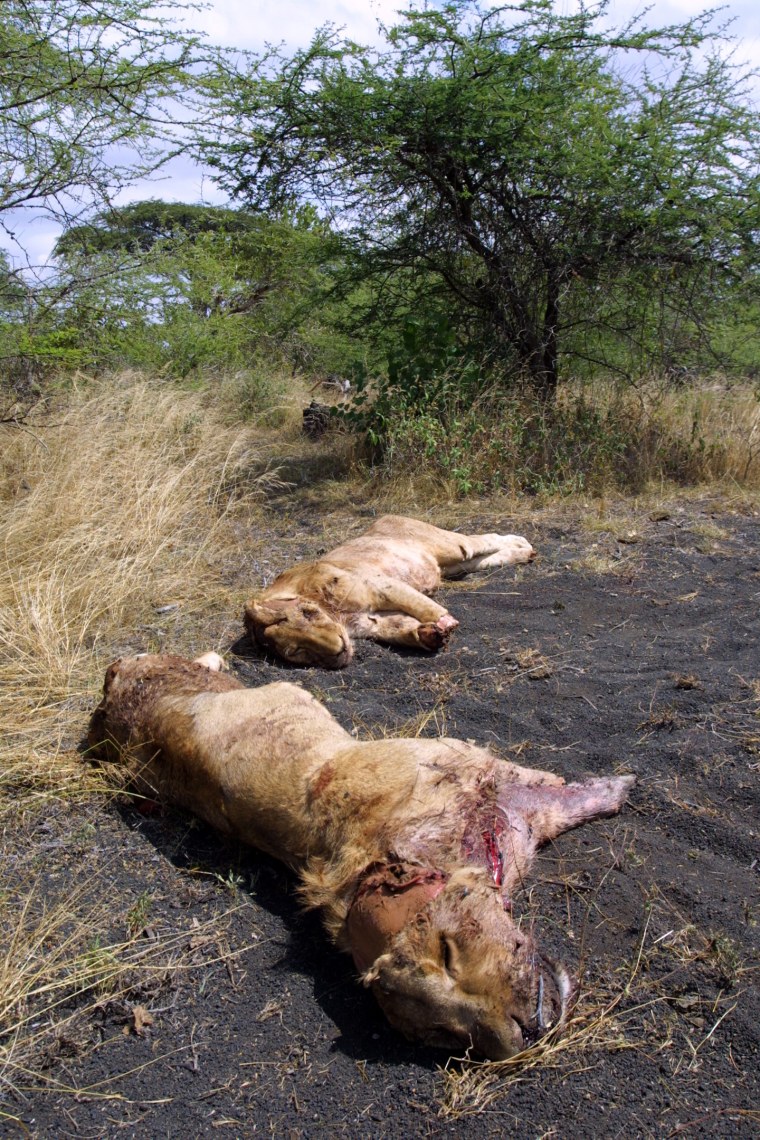Conservationists raised the alarm Thursday that lions in Kenya's Amboseli National Park face extinction within a few years unless action is taken to help them.
"The situation has reached a critical level," said Terry Garcia, executive vice president at National Geographic Society. "Unless something is done immediately, there will be no more lions in this part of Kenya, which would be a tragedy."
Fewer than 100 lions are estimated to remain in the 2,200-square-mile region at the base of Mount Kilimanjaro on the Kenya-Tanzania border, the society said. Lions are a major attraction at Amboseli, a popular visiting spot for tourists.
A major reason for the decline of the lions, researchers say, is spearing and poisoning by local Maasai, whose society depends on raising cattle.
"Tensions have always been high between Maasai tribes and the lions in this region where the economy is cattle-dependent," said Dereck Joubert, a National Geographic Society conservationist in Kenya. "Maasai depend on cattle to survive. They view themselves as stewards of the cattle. When their animals are killed, their solution is to get rid of the lions. We need to be able to immediately compensate the Maasai for cattle losses in order to stop the killings."
Compensation for cattle losses
National Geographic announced it is making an emergency grant of $150,000 to the Maasailand Preservation Trust to support a compensation fund for herdsmen whose livestock are killed by lions in and around Amboseli. It will also raise additional money from the public for the program.
Such compensation plans have succeeded in other areas, according to the Kenya-based conservation group Living with Lions.
Between 2003 and 2007, a total of 63 lions were killed in properties owned by the Maasai, Kuku Group Ranch and Olgulului Group Ranch, said Laurence Frank, director of Living with Lions. "On Mbirikani Ranch, where compensation began in 2003, only four lions were killed due to predator-livestock conflict during the same period."

Frank said that in 2006 there was a sharp spike in killings in Maasailand. "Two years later, rates are not as high, but the killings continue to be bad enough that if something is not done immediately, we will see these lions go extinct locally in just a few years."
"It is hard to imagine this part of Kenya devoid of lions and the deep lion roars that so symbolize the savannas," added Joubert.
In a statement, the society also noted that lions are sometimes the victims of ritual killings by young Maasai men. "Slaughtering a lion remains a rite of passage for some Maasai warriors, who test their prowess with spears," the society said. "The ritual involves cutting the tail off the slain lion and then visiting seven villages to dance with the tail in an effort to impress the women."
"Thankfully, as a result of educational programs in the region we have started to see instances of the ritual being rejected," Bonham said. "When the warriors arrive at a village, they are being sent away."
Lion body parts sold to tourists
But lions are also being killed for at least two other reasons.
"Sadly, in the last two years we’ve also started to see lion claws and teeth sold on the black market to tourists," said Bonham.
And Frank noted that "lions also are killed to garner attention from the outside world. "If the Maasai have grievances that they feel have not been given the attention deserved, they will, in some cases, go on a lion- or elephant-killing spree, hoping this will make the authorities take notice and address their concerns."
That happened in the early 1990s, the society stated, when Maasai completely eliminated lions from Amboseli National Park. "In that instance, the animals were able to come back over time with the help of lion populations from neighboring areas," the society said.
"If we allow lion populations to drop too low in Maasailand, the difference this time is that there is no source of replenishment from surrounding areas, which would make the future of the Maasai lions today much less certain," said Frank.
